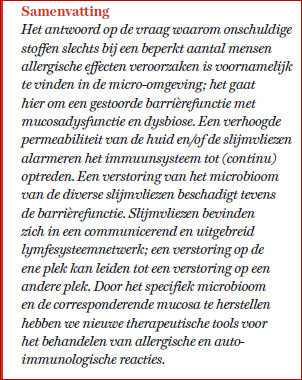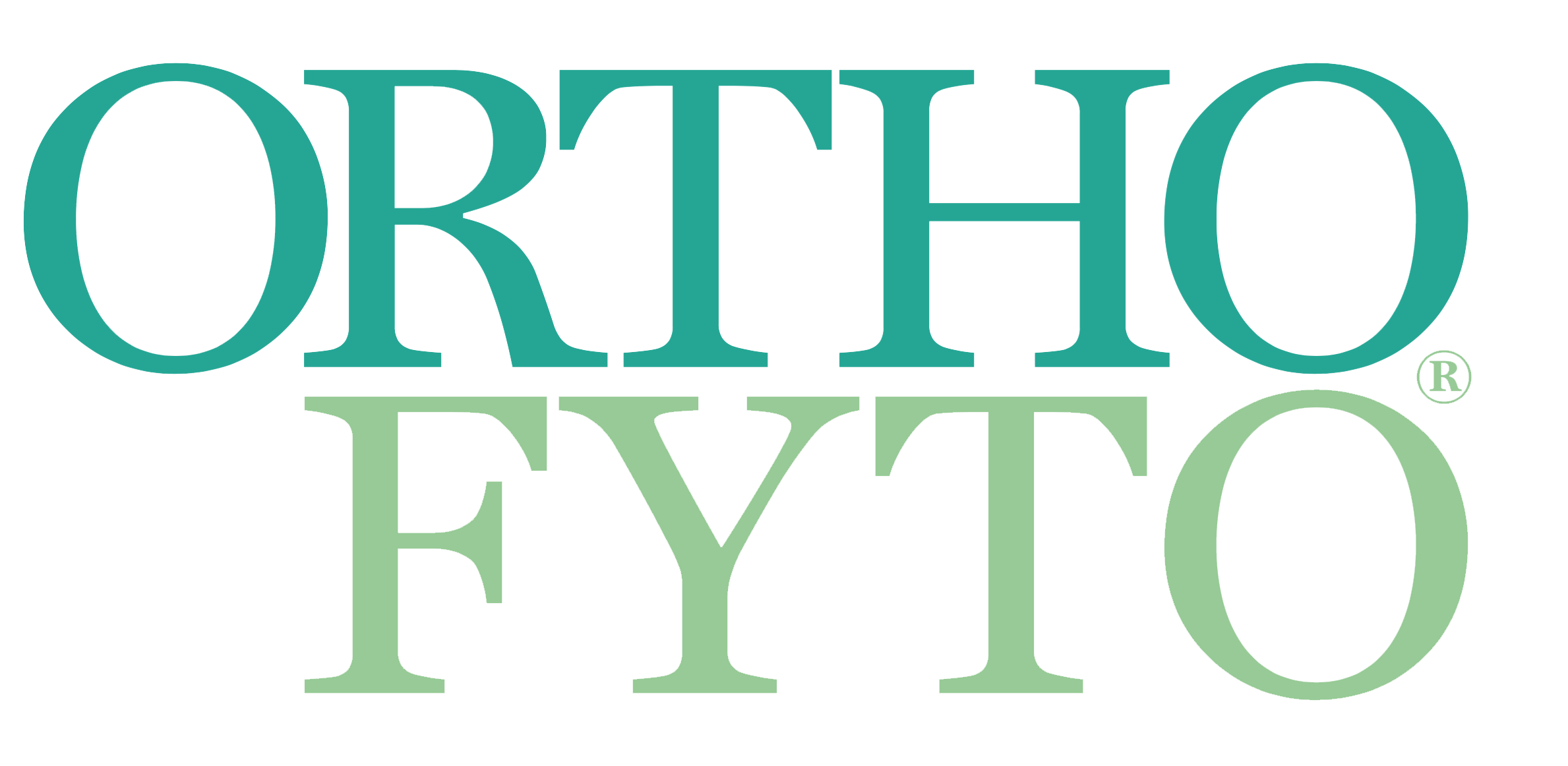Allergie en auto-immuniteit
09 Apr, 2020
Door: Gabriël Devriendt
 Hoe komt het dat ons immuunsysteem zich soms tegen ons keert? Allergie is een abnormale reactie van het lichaam op een bepaalde stof die bij de meeste mensen geen negatief effect uitlokt. Dit kan gebeuren na een insectenbeet of na het eten, aanraken of inademen van een stof. Het wordt steeds duidelijker dat de oorzaak niet in de stof ligt maar in de reactie van het lichaam op een bepaalde stof. Dat betekent dat er een probleem is met de barrièrefunctie en het onderliggende immuniteitssysteem.
Hoe komt het dat ons immuunsysteem zich soms tegen ons keert? Allergie is een abnormale reactie van het lichaam op een bepaalde stof die bij de meeste mensen geen negatief effect uitlokt. Dit kan gebeuren na een insectenbeet of na het eten, aanraken of inademen van een stof. Het wordt steeds duidelijker dat de oorzaak niet in de stof ligt maar in de reactie van het lichaam op een bepaalde stof. Dat betekent dat er een probleem is met de barrièrefunctie en het onderliggende immuniteitssysteem.
Bij de specifieke mogelijke allergieën – huisstofmijtallergie, hooikoorts (pollenallergie), allergische rhinitis, allergische astma, allergie voor insectengif, voedselallergie en contactallergie – gaat het meestal over doorgaans onschadelijke stoffen maar soms ook over toxines die in staat zijn om irritaties in de huid of slijmvliezen uit te lokken. Om ons tegen de buitenwereld te beschermen heeft ons lichaam primaire barrières zoals onze huid en onze slijmvliezen. Als er bij een goed beveiligde woning wordt ingebroken gaan de alarmen af. Analoog is het ons immuunsysteem dat het alarm in ons lichaam activeert indien de barrières worden doorbroken omdat er wordt ‘ingebroken’ (interlocaties).
Dit alarm of ons immuniteitssysteem wordt in principe doorlopend geactiveerd wanneer de huid of slijmvliezen continu beschadigd worden. Leaky gut of meer wetenschappelijk ‘intestinal mucosal dysfunction’ vormt de rode draad, niet alleen in alle darmpathologie maar ook in alle systeemziekten zoals astma, eczeem, reuma en zovele andere ziekten. De behandeling van allergische reacties bestaat er meestal in om de mogelijke allergische stoffen in kaart te brengen met het specifieke advies om deze stoffen waarop we reageren te vermijden wat vanzelfsprekend meestal een positief resultaat heeft. Tevens wordt vaak tegelijkertijd het reactieve immuniteitssysteem medicamenteus stilgelegd met o.a. cortison of immuniteitsblokkers. Men bestrijdt dus niet de werkelijke oorzaak, maar de gevolgen; in feite draait men de wereld op zijn kop.
Het is nogal logisch dat de alarmen ingeschakeld blijven zolang er ingebroken wordt. Willen we een werkelijke oplossing vinden dan dienen we ons eveneens te concentreren op de factoren die de barrièrefunctie ofwel beschermen of beschadigen.
- Frati et al. (2019) The role of the microbiome in asthma: The gut-lung axis. International Journal of Molecular science). Jan; 20(1): 123.
- Dietert RR, Piepenbrink MS. (2008) The managed immune system: protecting the womb to delay the tomb. Hum Exp Toxicol. Feb;27(2):129-34.
- Deitch EA, Xu DZ, Qi L, Berg RD. (1991). Bacterial translocation from the gut impairs systemic immunity. Surgery. 1991 Mar;109(3 Pt 1):269-76
- Wang M, et al (2008) Atopic dermatitis and skin disease: Reduced diversity in the early fecal microbiota of infants with atopic eczema. Journal of Allergy and Clinical Immunology. Volume 121, Issue 1, Pages 129–134
- Zeissig, S. & Blumberg, R (2014) Life at the beginning: perturbation of the microbiota by antibiotics in early life and its role in health and disease. Nature Immunology Volume:15, Pages:307–310
- Prescott,SL, Clifton, V. Asthma and pregnancy: emerging evidence of epigenetic interactions in utero. Current Opinion in Allergy & Clinical Immunology: October 2009 - Volume 9 - Issue 5 - p 417–426.
- Mortaz E, Adcock IM, Folkerts G, Barnes PJ, Paul Vos A, Garssen J. (2013) Probiotics in the management of lung diseases. Mediators of Inflammation. 2013:751068
- Tamburini et al. (2016). The microbiome in early life: implications for health outcomes. Nature Medicine7;22(7):713-22
- Paparo L et al (2019) Targeting Food Allergy with Probiotics Adv Exp Med Biol. 2019;1125:57-68.
- Ouwehand AC (2007) Antiallergic effects of probiotics. J Nutr. Mar;137(3 Suppl 2):794S-7S.
- Niedermann,T. Röcken, M. Carballido, J (January 2004) TH1 and TH2 Lymphocyte Development and Regulation of TH Cell Mediated Immune Responses of the Skin Journal of Investigative Dermatology Symposium Proceedings Volume 9, Issue 1,Pages 5-14
- Weng,M., Walker, W. (2013) The role of gut microbiota in programming the immune phenotype J Dev Orig Health Dis.1; 4(3)
- Zeissig S, Blumberg RS. (2014) Life at the beginning: perturbation of the microbiota by antibiotics in early life and its role in health and disease. Nature Immunology Volume:15, Pages:307–310
- Rautava, S. (2002) Probiotics during pregnancy and breastfeeding might protect against atopic eczema Journal of Allergy and Clinical Immunology Volume 109, Issue 1, Pages 119–121
- Steelant B, Seys SF, Restauring airway epithelial barrier dysfunction: a new therapeutic challenge in allergic airway disease Rhinology 2016 Sep;54(3):195-205
- Renz,H. Per Brandtzaeg,P. Hornef, (2012) The impact of perinatal immune development on mucosal homeostasis and chronic inflammation. Nature Reviews Immunology 12,9-23
- Brandtzaeg, P. (2003) Mucosal immunity: integration between mother and the breast-fed infant. Vaccine Volume 21, Issue 24, Pages 3382-3388
- Wendy H. Oddy (2004) A review of the effects of breastfeeding on respiratory infections, atopy, and childhood asthma, Journal of Asthma Vol. 41, No. 6, pp. 605–621
- Cunningham-Rundles S (2005), Mechanisms of nutrient modulation of the immune response. J Allergy Clin Immunol. 115(6):1119-28.
- Wang X , (2013) Zinc supplementation modifies tight junctions and alters barrier function of CACO-2 human intestinal epithelial layers. Dig Dis Sci.Jan;58(1):77-87
- Blum, S. (2003) Intestinal microflora and homeostasis of the immune response: implications for probiotic bacteria? Curr. Issues Intest. Microbiology 4, 53-60 Inf
